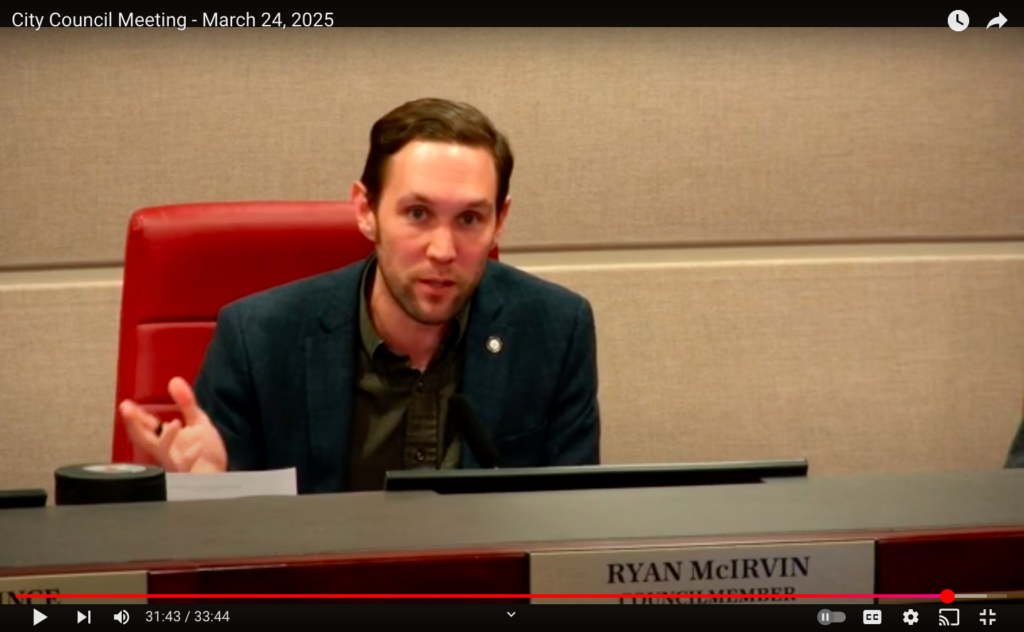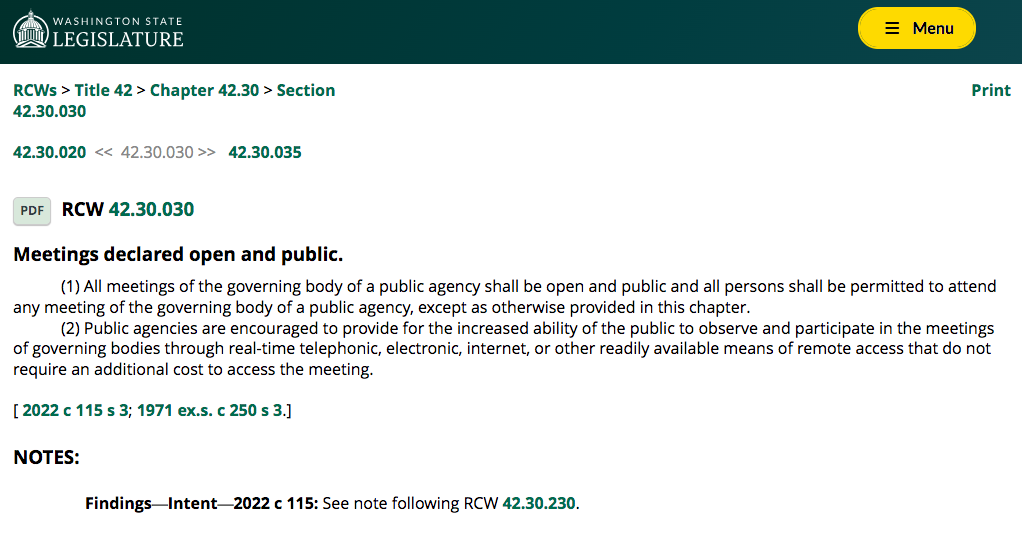
“I know you’ve had the opportunity to meet with everyone, but I just want… I don’t want there to be the appearance that we’re not listening….that I haven’t heard. I just I don’t know that this format lends itself to being the best one for discussion. But if there’s a discussion that needs to be had, I’m happy to have it when that time is right.” (Council Member McIrvin, at 3/24/25 meeting)
Council observers have recently seen Renton residents complaining about not being heard at Council Meetings, and Council refusing to act, or even discuss acting, on issues that are brought before them by the public.
Individual Renton Council Members have no authority individually. But when a quorum of them agree on an issue, they have more authority than the Mayor. They are like the city’s “Board of Directors,” while the Mayor is CEO.
But the only way Council can use their authority, or even talk about using it, is in an open public meeting. So we taxpayers fund a comfortable council chambers, and staff it with a Clerk, Chief Administrator Officer, City Attorney, department heads, and a recording crew so that Council Meetings can be productive and effective.
We also provide an opportunity for Renton residents to interact with their council at these meetings, as Public Agencies are encouraged to do by state law.

By law, governing body meetings must be public, and public agencies are encouraged to help the public participate in the meetings.
The nature of these open meetings came to a head last night as North Renton resident Matt Hanbey pleaded with Renton Council, again, for assistance with the Logan Six project. He recounted that he had diligently met with each Council Member one-on-one, sent them thorough written correspondence, and had approached the Council multiple times before, conjuring the image of Sisyphus perpetually pushing a rock up the hill. He begged Council to at least discuss his concerns.
None of Renton’s elected officials acknowledged Mr. Hanbey’s testimony. Then another North Renton resident, Sheryl Friesz, approached the podium and made an announcement: because of Council’s inaction of any kind, North Renton felt compelled to appeal the Logan Six project in King County Superior Court. She had gathered pledges for the necessary funds from her neighborhood within 12 hours of asking.
North Renton residents will now pay three times for work the Council could have done: they’ll pay the salaries for Council Members who didn’t want to hear the appeal; for city lawyers defending the Hearing Examiner decision in the appeal; and for North Renton lawyers pressing the appeal. Of course every taxpayer in Renton will contribute to the city legal costs, so this impacts all of us.
This left lingering questions about why the Council didn’t even try to discuss the issue with each other, or with the residents pleading for action, at anytime leading up to this legal action. Last night’s meeting had very little on the agenda and only lasted 32 minutes; Renton Council certainly could have taken some time to try to keep this issue out of court, perhaps by at least agreeing to work to prevent future similar disputes.
In the last few minutes of the meeting, Council Member Ryan McIrvin provided the only real acknowledgement of North Renton’s presence and concerns, and apparently attempted to answer the question everyone was wondering about– why Council wouldn’t say anything. He deserves credit for his courtesy and candor, but his comments revealed a larger problem.
Council Member McIrvin said he does not feel that Council Meetings are conducive to dialogue with residents. But for many decades, the Council regularly held dialogue with residents during Council Meetings, sometimes putting solutions in motion while the residents were still at the podium. It used to be standard practice for Council Members to ask speakers questions to get more information about their concerns, and then talk among themselves about how the issue could be solved. Often the Council would refer the issue to the appropriate Council Committee or staff.
In suggesting this channel for dialogue is closed, it leaves no avenue for residents to discuss issues with the full body that is empowered to help them. North Renton had already met one-on-one with Council Members, but no individual council member is empowered to do anything by themself. I appreciate identification of the problem, but Council Member McIrvin and his Council colleagues must now repair this communication channel for our city to function at its best again.
“I just wanted to address some of the commentators in the audience we’ve heard. I don’t think this this format up here really makes itself too super-conducive for a two-way dialogue, but I’m still remaining happy to have conversations with folks. I know you’ve had the opportunity to meet with everyone, but I just want… I don’t want there to be the appearance that we’re not listening….that I haven’t heard. I just I don’t know that this format lends itself to being the best one for discussion. But if there’s a discussion that needs to be had, I’m happy to have it when that time is right.” (Council Member McIrvin verbal comment, transcribed from this meeting.)


The council only discusses what city staff tells them to discuss.
Must be campaign season…. councilmembers are starting to “care.”
Ryan, when I heard you say the Council meeting isn’t conducive to discussions, it explained so much. You and your colleagues believe you work for the mayor, and he has instructed all council members to not speak to speakers at Audience Comment. Renton City Council, your lack of engagement with the public during council meetings is unexplainable. It’s very rude that no one acknowledges speakers. And Council Members work for the people, not the mayor. Actually, the mayor should be working for Council. Council makes policy and budgets; the mayor instructs City Staff to carry out Council’s decisions.
If you believe this silence is helping you not have to deal with unpleasant issues you are wrong. It’s making it worse for each one of you. To think that meeting privately is more appropriate than discussing during the Open Public Meeting is wrong and concerning.
Council meetings used to be much more interactive. Council business was discussed on the floor. That is transparency. It gives the public an opportunity to better understand. If there are disagreements between CMs, it was debated openly.
To prove that the Renton City Council WAS very different than it is today, I reviewed old meetings, https://www.youtube.com/@CityOfRentonVideo/videos.
On the TOP LEFT, choose OLDEST. It currently goes back to 2012.
Here are a couple that are examples:
DTR business owner spoke for 5 minutes, Council added 3 more minutes for her to finish; then Greg Taylor thanks Ms. Horne
June 11, 2012 West Hill Annexation comments; mayor Denis and Randy discuss WITH SPEAKER:
Marcie Palmer
Renton City Council
2004-2015
Thanks Marcie for finding these examples of the types of problem solving and information sharing we used to do routinely on Renton City Council during the audience comment section. The audience comments section was usually my favorite part of the council meetings, because we frequently got to know people we hadn’t met before, and we were often able to help them on the spot. Even if we could not help them immediately, we could share information they needed, or put an item into a committee to study it for them (and invite them to the committee meeting.)
In the first clip I appreciate how Greg Taylor just instinctively asked for more time for the speaker, who was making important points about the nature of her business, and sharing research she had done about parking for it. We almost always did this if someone was covering a complex topic, and running out of time while trying to give us a lot of information. Then Greg and Don Persson took the lead to get the issue into the right committee. If they had not initiated the action, one of the other five of us on council would have, or Mayor Law would have.
In the second clip we had a meaningful and valuable dialogue, which was typical in those days. I wanted to ensure the West Hill neighborhood, including the speaker, knew exactly what the current opinions and concerns of the Council were so that she was able to act with full and accurate information. I always felt the public deserved to know exactly what we were thinking and why. I always kept an open mind (as did other council members) because there might always be new information, or residents might have data showing that information we had was incorrect. The only way residents would know what information we might need, is if we were transparent about our motivations and why we were making the decisions we were making.